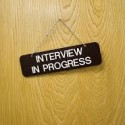
Rarely do things happen as quickly as we would like. If you have been in the market for more than six months, then there is probably a missing link in your thinking, strategy or execution. Here are ten tips to help break through the job hunting frustration and land that interview.
• Be sure the resume you are using is streamlined and effectively
communicates the skills you are offering. Key word inclusion is a
must as companies utilize electronic screening processes. Have two
versions of your resume: one geared for web transmission and an
attractive one for sending hard copy or for distribution when you
arrive at the interview.
* If you are over forty, do not list your employment experiences beyond the past fifteen years on your resume, unless they have been with one continuous employer. Never reveal personal information, and do not let the resume exceed two pages.
• Direct your cover letters to a specific person, whenever possible. The most effective target is the hiring manager of the position you want, rather than human resources. Once you know the name of the company, take the time to research the name of the hiring manager. This also provides the foundation for your follow up phone call.
• If a published ad says to respond to human resources, send a resume to both HR and the hiring manager. It doesn’t matter if there are two copies of your resume at the same company. You do not want the fate of your future career to be in the hands of a screener. To ensure that the hiring manager sees your resume, send it directly to him or her.
• While it may be difficult or unrealistic to follow up resumes sent to every company, it is imperative that you personally follow-up with the ones that you are really interested in. To the recipient, too many applicants look alike on their resumes, especially when they are competing for the same job.
• Distinguish your candidacy by taking the time to call and personally introduce yourself. It identifies a real person and offers the opportunity to start building a rapport with the person you might be working for.
• Don’t have unrealistic expectations of agencies and executive recruiters. They are not personal agents to candidates. The occasional exceptions are if your skill set is in very high demand or if you are considered a superstar in your industry or discipline. Even then, headhunters will not spend an inordinate amount of time on your search. It distracts from their critical focus of filling specific openings for their client companies, from which their income is derived.
• Remember that the Internet is a double-edged sword. While it has opened up tens of thousands of jobs that you can identify rather quickly, it has also significantly increased your competition for any job. As with headhunters, do not think that you can register your resume on multiple sites on the Internet and wait for your phone to ring.
• There is no substitute for the power of relationships in the job seeking process. Networking still remains the number one source of job information and referrals for the professional and executive. Make an effort to broaden your network beyond your immediate industry or discipline.
Look for opportunities to meet new people and to be of assistance or value to them. Networking is a reciprocal process. Doing for others minimizes any feelings of the “hat in hand” self-consciousness that some people feel when they are unemployed.
• Avoid using published jobs as your primary source of opportunities. They only represent about ten percent of the jobs available at any given time. Use multiple methods and resources to maximize leads: networking, classified ads, direct marketing, headhunters, and the Internet.
• Do not wait for a hot lead to “play itself out.” Even if you have one or more prospects where the company has shown interest in you, you need to continue developing new leads. This way, if a company takes too long in the selection process, if the job search is cancelled, or if it is filled with another candidate, you won’t be stranded. You should not stop the job search process until you have a written offer in hand that you intend to accept.




